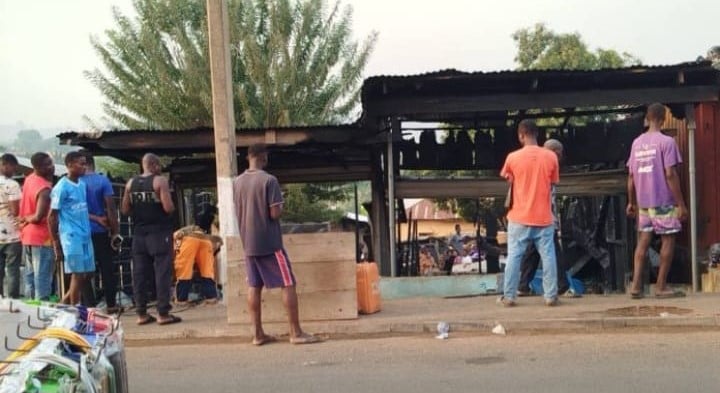The late afternoon of Friday, January 10, 2025, witnessed a devastating fire outbreak along the Ahoe-Stadium Road in Ho, Volta Region, Ghana. Three adjacent wooden shops – an electrical shop, a plastic ware shop, and a shop stocked with packaged water and drinks – were completely destroyed by the rapidly spreading flames. The fire, fanned by the dry harmattan winds prevalent during that time of year, threatened to engulf more structures in the area. The swift response of the Ghana National Fire Service (GNFS), however, prevented further devastation and contained the inferno. While the exact cause of the fire remained under investigation by the GNFS at the time of the report, preliminary eyewitness accounts suggested a possible origin linked to a nearby domestic incident.
Deputy Chief Fire Officer (DCFO) Mr. Joy Ayim Ameyibor, the Volta Regional Commander of the GNFS, confirmed the incident and lauded the prompt action of his team in preventing the fire from spreading beyond the three affected shops. He emphasized the ongoing investigation into the cause of the fire, assuring the public that a thorough assessment would be conducted to ascertain the precise origin and contributing factors. The swift response of the fire service undoubtedly played a crucial role in minimizing the overall damage and preventing further loss of property and potentially lives. This highlights the importance of a well-equipped and responsive fire service in mitigating the impact of such emergencies.
An eyewitness account provided a preliminary narrative of the fire’s possible origin. According to the eyewitness, the fire might have started from a wooden kitchen structure situated near the affected shops. The narrative indicated that a coal fire, left unattended in the kitchen, could have been the source of the initial ignition. This account, while insightful, remained subject to verification by the official investigation being conducted by the GNFS. The potential danger posed by unattended cooking fires, especially in structures made of flammable materials like wood, underscores the critical need for fire safety awareness and precautionary measures in both domestic and commercial settings.
The fire outbreak caused significant disruption to both commercial activities and traffic flow along the Ahoe-Stadium Road. Vehicular traffic was temporarily halted as firefighters battled the blaze and secured the area. Business owners, many of whom witnessed the destruction of their livelihoods, were left distraught as their investments, estimated to be worth thousands of Ghana Cedis, were reduced to ashes. The incident brought into sharp focus the precarious nature of small businesses and the devastating impact that such unforeseen events can have on the economic well-being of individuals and communities.
The incident highlights several critical aspects of fire safety and disaster management. Firstly, it emphasizes the importance of prompt and effective response from fire services in containing fire outbreaks and preventing further spread. The timely intervention of the GNFS in this case undoubtedly minimized the damage and prevented potentially greater losses. Secondly, it underscores the need for thorough investigations into the cause of fires to identify contributing factors and implement preventive measures. Understanding the origin of fires can help prevent similar incidents in the future.
Finally, the incident underscores the significant impact that fire outbreaks can have on businesses and individuals. The loss of livelihoods and investments can have devastating consequences for those affected, highlighting the importance of fire safety awareness, preventive measures, and insurance coverage to mitigate such risks. The destruction of the three shops served as a stark reminder of the vulnerability of small businesses to unforeseen events and the importance of community support in helping those affected rebuild their lives. The incident also highlighted the need for urban planning that considers fire safety and the proper spacing of structures, especially those made of highly flammable materials, to prevent the rapid spread of fires.














